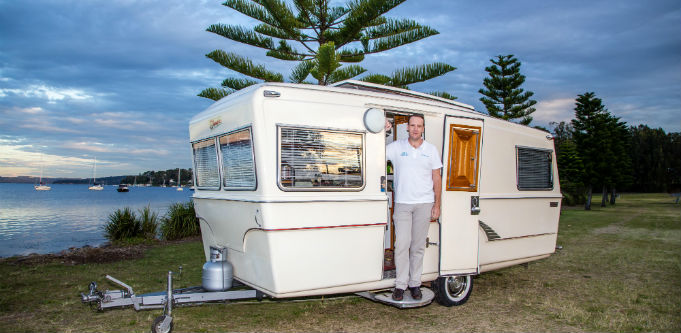
Camplify founder and chief Justin Hales. Source: Supplied.
Campervan sharing economy startup Camplify has scored a big win for its users, securing a ruling from the Australian Taxation Office that allows motorhome owners to claim tax deductions on any expenses accrued through using the platform.
The ATO’s ruling is a landmark decision as it represents the first time people using sharing economy platforms will be able to claim tax deductions on things like maintenance expenses, without having to register the activity as a business.
Camplify offers an Airbnb-style sharing economy platform, allowing owners of caravans, motorhomes and campervans — or recreational vehicles (RVs) — to lease them out on a short-term basis.
Co-founder and chief executive of Camplify Justin Hales tells StartupSmart he initially approached the ATO to “engage with them on how this would work under current tax laws”, and to come to an agreement as to how the system could work better for Camplify’s customers — that is, the owners of the vehicles.
But it wasn’t exactly an easy process; it took 18 months in total and required Hales to provide data, models and information about the platform and his vision for consumers. He also needed to work with an accountant and financial expert to help get in front of the right people.
“It was about providing the right information in terms of what we believed this meant for our customers, being able to add a lot of value to our owners, and being able to position them in a way that works for them in a financial arrangement,” Hales says.
“A lot of that is tax.”
According to Hales, the motorhome market is, in some ways, similar to the regular home market, in that a motorhome is an investment and “a very interesting thing to take a decision to purchase”.
While they can cost up to $60,000, the majority of motorhomes are only going to be used for six weeks of every year, he says. It’s an “investment into an asset that’s only going to sit on your front lawn”.
Part of the reason the property market has been gaining momentum in Australia is because of the tax laws in place, Hales says, and so he and his co-founders “made the decision that we would go and champion RV owners to be in the same place as homeowners”.
Although the tax ruling is specific to Camplify at the moment, Hales hopes it could set a new precedent for the sharing economy as a whole.
“The government is now understanding that this is a true source of income, and it’s something that’s changing in people’s use of that type of economy,” he says.
“It’s important for people who want to drive [the sharing economy] and be innovators to be rewarded for being early adopters,” he adds.
The next phase of growth
Launched in 2015 with about 100 motorhomes on its platform, Newcastle-based Camplify started out with a $30,000 investment as part the Slingshot startup accelerator.
Now, it has 4000 RVs across Australia and in the UK. The business has facilitates between 1500 and 2000 rentals per month and is valued at between $16 and $20 million, according to Hales.
Hales is also thinking about expanding further into Europe, exploring “really great markets” in Spain, France, Germany and Italy.
But that’s not to say he’s losing focus on Australia. The next growth stage for the company will include providing RV owners with better services, and “opening up this opportunity of seeing Australia in an RV to holiday makers”.
While Hales says he’s seen “a million” challenges along the way, the best advice he has to offer to other founders and entrepreneurs is “really digging into what the motivation of your customer is” and “championing [your] customers”.
While Hales thought, early on, that RV owners’ motivation would be around sharing their lifestyle and having a positive impact on the community, it turned out their main motivation for listing on the platform was to make some money.
“We actually quickly learnt that the prime motivation for our [RV] owners was about getting a return … getting some financial upside from owning an RV,” he says.


COMMENTS
SmartCompany is committed to hosting lively discussions. Help us keep the conversation useful, interesting and welcoming. We aim to publish comments quickly in the interest of promoting robust conversation, but we’re a small team and we deploy filters to protect against legal risk. Occasionally your comment may be held up while it is being reviewed, but we’re working as fast as we can to keep the conversation rolling.
The SmartCompany comment section is members-only content. Please subscribe to leave a comment.
The SmartCompany comment section is members-only content. Please login to leave a comment.